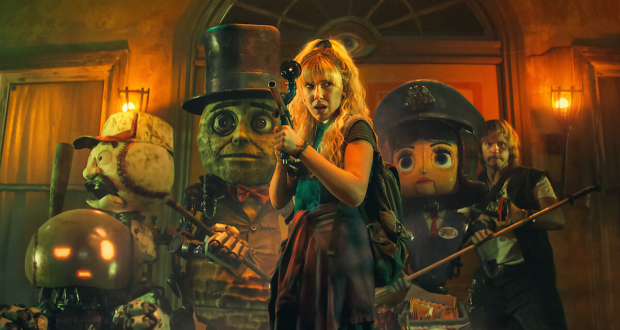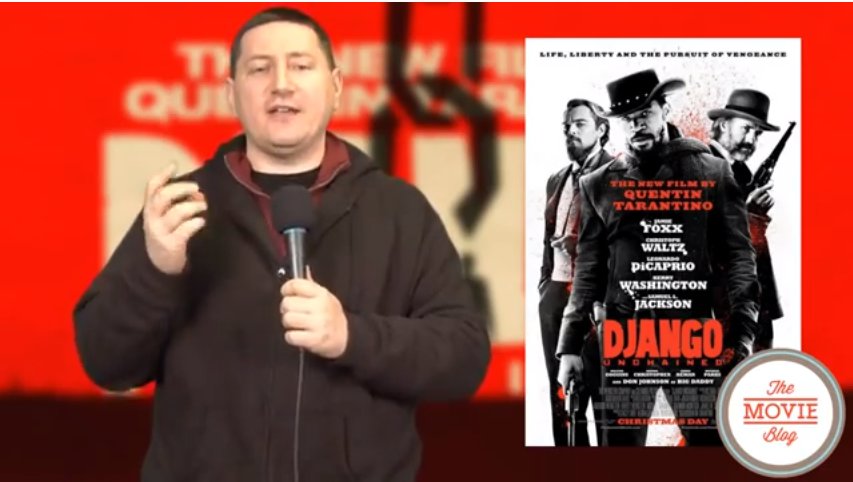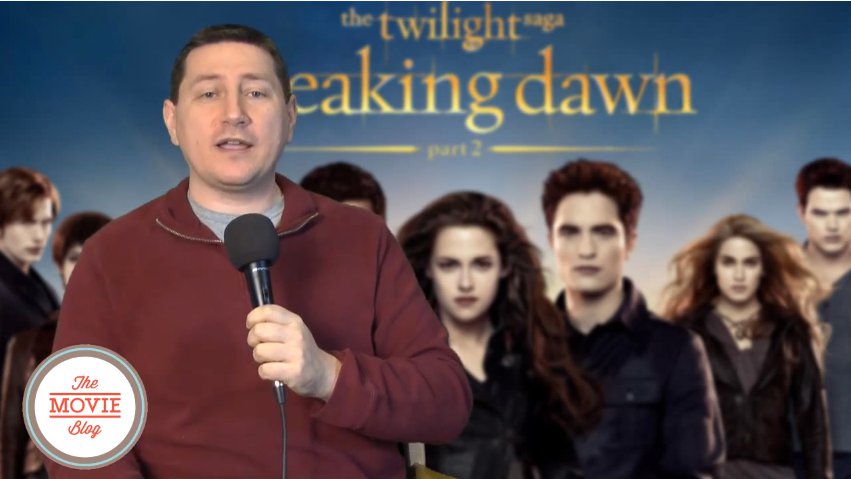 For those of you who have been reading The Movie Blog for at least 2 years or more, you may remember that at one point I signed a small book deal with an even smaller publisher to write a book that I was calling “The Silver Screen From Where I’m Sitting”.
For those of you who have been reading The Movie Blog for at least 2 years or more, you may remember that at one point I signed a small book deal with an even smaller publisher to write a book that I was calling “The Silver Screen From Where I’m Sitting”.
The book was supposed to just be a coffee table book about movies and the movie world where you could just pick it up and turn to any chapter and start reading. Each chapter was just it’s own isolated topic and thus the book didn’t have to be read in order.
Ok anyway… I got several months into the book, sent it off to the editor a couple of times along the way… but eventually I just got too busy. The book got delayed, and then last year I started work on my upcoming Documentary movie “Prince of Peace – God of War” and any time I had was just flushed away. The publisher was very nice to me and understood my situation and we just decided to cancel the book.
So now here we are, and I’ve got 7 chapters that I wrote just sitting here. That’s when I decided I might as well just release some of what I wrote for the doomed book here on The Movie Blog. So for the next week, I’ll be releasing a chapter a day here on the site (the ones that don’t suck too much anyway).
The Second Chapter I’m releasing here is called: “ The Cost of Going to the Movies and the need for Change in the Film Industry.” It looks at the crazy cost of going to the movies, the cost of concessions, piracy, where the money goes, why they charge so much, and the desperate need to change.
So if you’re up for it, continue on reading (If you missed the first chapter you can see it here)
Chapter 2: The Cost of Going to the Movies and the need for Change in the Film Industry.
“They say that the movies are magical. They extend our imaginations and at the same time bring our imaginations to vivid life for our very eyes to see. They move us, compel us and inspire us. In the midst of 2 hours they can make us laugh, make us cry, make us happy or sad. They show us the world as it is, was or even could be. Yes, the movies are truly a magical thing. Each one of us experiences the magic in different ways. But we all share in one common experience… the magical trick of watching our money disappear when we come to one of your theaters.”
These were the words that began my September 9, 2004 “An Open Letter to the Theater Chains” post on The Movie Blog. The premise of the letter was a simple one. I (along with many others) have become frustrated with the outrageous cost of going to the movies.
The movie business in North America is facing the beginning of a crisis that they unfortunately are either in denial of or are just failing to recognize. It is a problem that I contend has not been encountered by this industry before. In general terms, the film industry is now facing a growing segment of movie theatre patrons who are becoming unsatisfied with the movie going experience. This dissatisfaction will have more consequences than a few grumblings customers walking out of a show… it will ultimately lead to a financial crisis the likes of which the business hasn’t seen in decades. For the first time in my short life, people will turn away from the movie theatres in mass numbers and spend their disposable income dollars, earmarked for entertainment, on other more accessible, less expensive and more appealing outlets.
There are several small elements that, when combined, creates an exponentially growing disenfranchising effect on the average movie fan, like me, that if left unchecked will ultimately lead to this crisis I’ve alluded to. Admittedly these elements may seem small on their own, perhaps even inconsequential, but the negative effects they create are already being felt on a small level, and I predict will grow to a critical point unless addressed.
Problem #1 – The cost of getting into the theatre
I’m not some sage old-timer reminiscing about the “good ol’ days” when hamburgers were a nickel. I’m barely in my early 30’s, and I can easily remember going to the show as a young teenager and only having to drop somewhere between four to five bucks for a movie. Tuesdays were even better! I don’t know what it was like where you lived, but here in Ontario we had $2.50 Tuesdays. Saving up to go with a date (yeah, even I had one or two of those) still required a bit of sacrifice (at least that’s how I saw it at the time), but the movies were worth it!
I just laugh at myself now for ever thinking that four or five dollars was a little steep to see a movie. Like so many other things in our lives I never really appreciated how much of a good thing I had (the relatively low price for going to a movie theater) until it was gone. But trust me my friends, I appreciate those days with staggering poignancy whenever I approach the ticket window at my local theater these days. I’m sure the experience I’m about to relay is one that you’ve had to live through on several occasions yourself with equal horror.
I went to the local Silver City Theatres in my home town of Hamilton Ontario a short time ago and decided to check on the current ticket prices. It was a Thursday night on a non-holiday. As I walked up to the courteous young woman behind the ticket counter I was hit once again with that wonderful feeling I get whenever I’m in a theatre… man I love the movies! However, that magical feeling was quickly replaced by a sickening nauseous dizzy sensation as the above mentioned courteous young woman informed me that the price for one (1) ticket to get into a show that night would cost me… are you ready for this… $13.75 after tax (Canadian Funds). I couldn’t tell if it was my heart in my throat or a little bit of my lunch getting ready to make an appearance.
Yes, it was going to take just a bit under $14.00 to get me into the show that night. Unreal. As I stood there contemplating finding a second job or selling my car to finance my overactive movie addiction, a second wave of nausea struck me as this thought crossed my mind: “What if I had a date with me?” Granted, the danger of me finding myself with a date on any given night is usually a small one, however the point should still be made. If I had walked into the theatre that night with some poor unfortunate soul as my date, it was going to run me just under $28.00 to get us in the door. Oh man, where were my $2.50 Tuesdays now?!?!
Problem #2 – The cost of Concessions
After taking a few moments to compose myself and recover from the emotional trauma of spending that much to get in the door, I walked over to the Concession Stand to grab myself a snack. The walk was made much easier thanks to the lighter wallet that was in my pocket. I’ve gotta tell ya folks, I just love having a Coke and a popcorn when I watch a film. It’s almost like my body has a Pavlovian response when I walk into a theatre. Mmmmm… my mouth instantly starts watering for some of that salted buttery goodness.
I looked around the menu board trying to decide what I would have to satisfy my snackiness. I noticed that there was a combo DEAL. The word DEAL was a welcome sight to my now impoverished eyes. How generous of the theatre to offer me some savings after putting a second mortgage on my home to get in. Here was the DEAL. 2 regular sized soft drinks and a large popcorn for… $12.00 after taxes?!?! $12.00 was the DEAL?!?! I started to read the menu again… surely it must have read “2 soft drinks, 1 large popcorn and 2 medium rare grade A steaks” for the low DEAL price of $12.00. Alas it did not. For what it would cost me to buy a 24 case of Coke, and a box of 25 bags of microwave popcorn (which tastes pretty good by the way), I was going to get one bag of popcorn and 2 drinks. Something is wrong in the world today.
For those of us who are not mathematicians, for me to go to the theatre with a date that night, purchase 2 admission tickets and a DEAL combo of 2 medium soft drinks and a bag of popcorn, I was looking at shelling out just under $40.00 for the evening. At the risk of sounding like a cheap scrooge, that’s just not reasonable. Thank heavens that I didn’t have to pay for a babysitter (thank heavens for that one on several levels) or pay for parking (some places in Toronto require you to dish out 7-10 bucks to park if you want to drive to their theatres).
Problem #3 – Commercials
So there I was, just some poor average guy who just had to spend basically all his disposable income for the week on one movie. Oh well, at least the worst was over. I was going into a film I had been waiting for over a year to see so I was pretty excited. The show was advertised as starting at 7:20pm so I made sure that we were there by 7pm to buy the overpriced tickets and the really over priced snacks and still have a couple of minutes to spare. Found my way to my seat and sat down. I’m sure glad I planed my evening in such a way to ensure I showed up on time. Everything was fine now… until….
COMMERCIALS! More commercials, then bloody more commercials! I sat through 12, that’s right 12 minutes of painfully annoying commercials. I’m not talking about trailers, oh no no no, trailers I enjoy. I’m talking about pure product marketing, television show interrupting commercials for everything from cars to feminine hygiene products. I was forced to endure a gum commercial, then a fruit juice commercial, then a dating service commercial, then a “buying your movie tickets online” commercial, then a made for Canadian Television movie of the week commercial and then a car commercial. I sat in my humble little seat feeling myself slipping into some form of altered state murderous rage as my fingers angrily dug deeply into the bag of popcorn on my lap (which in hind sight I really should have treated more gently considering what I paid for it), all the while a haunting question rang through my mind: “I paid for this?!?!”.
Hey, I understand the need for advertising in general. I have some small advertisements on The Movie Blog. Advertising and marketing are excellent sources of revenue for almost all mediums. Look at television. Aside from paying your cable bill, you basically get to watch all the shows for free (aside from pay-per-view). I think it’s perfectly reasonable then for us to have to see some commercials in exchange for this programming. No problem. But when I come to your theatre on a Thursday night and plop down $14 for a frigging ticket, I expect that included in that price is the freedom to not have to sit through a bunch of ads before seeing the film I PAID to watch! In essence, I was now paying to watch these commercials. That’s so outrageous I should say it again. I WAS NOW ESSENTIALLY PAYING TO WATCH COMMERCIALS.
The idea that I went out of my way to be there when they advertised the film was starting, then paying too much to get in, then paying too much for snacks only to discover that I must now be subjected to anywhere between 10-15 minutes of commercials at the exact time they said the film would be starting just drives me crazy.
One of the principles which also gets under my skin about this whole issue of sitting through commercials at the movies is the concept of compensation. When I have to watch commercials on television, in return I get to see the television shows for “free”. When I see advertisements on websites I like to visit, at least in exchange I get to enjoy the content of the site. Fine, you made me pay nearly $14.00 for my admission ticket, at least in exchange I get to come into the theatre and watch the film I came to see. Ouch, you charged me far too much for snacks, but at the very least I get to enjoy eating and drinking them. In all of these things there is the idea of being compensated for what I had to pay for or sit through. That’s fair enough.
However, for lying to me about when the movie started (in reality, the film they advertised as beginning at 7:20pm didn’t actually begin until about 7:42pm) and for making me sit through all those stupid annoying commercials, my compensation was… nothing. I got something out of the tickets. I got something out of paying for the snacks. For sitting through your commercials, for stealing 12 minutes of my time, you gave me nothing in return. That’s annoying folks.
The grass roots of discontent
Even I have to admit that on the surface the three points mentioned above seem like just a bunch of self righteous ranting. However, when you consider that this is an industry based on entertainment, and in entertainment (casinos, horse racing, concerts, plays, video games, sporting events, and yes movies) the sole question in determining weather a patron will engage in your industry’s activity again is “Did they enjoy the experience of coming to/participating in your event/activity”?
Ultimately this is all that matters. Did the audience enjoy the experience of coming to the movies that night? As a collective whole, the film industry must realize that this question is not exclusively if they enjoyed the movie or not. Everything that happens before, during and after the showing of the film plays a part in the overall experience of going to the movies. On some levels they seem to understand this. In recent years they have constructed bigger and more glamorous theatres with brighter lights, bigger screens and more comfortable seating (all good things). But the issues of ticket pricing, concession costs and pre-film commercials (along with others) have yet to be addressed and are actually becoming more of an issue with each passing year.
Cam is a friend of mine who works a dream job that has him traveling all over the world. Recently he returned from 2 months in Australia and dropped into the office to see me. About half way through our conversation he mentioned that he and another friend went to the movies the night before. To the best of my recollection, this is what he said to me:
“You know what John, I’m NEVER going to a movie again. I haven’t seen a movie in 2 months and I forgot how stupid going to the theatre has become. We rushed to get there on time, I had to pay $27.00 for the tickets and when we got in there they made us watch almost 20 minutes of commercials. I couldn’t believe it. I was so pissed off! And you know what else? I figure for what I paid to go watch a movie I could have bought a new X-Box game that would have given me a whole hell of a lot more enjoyment then what I had to put up with last night”.
Did you notice the most interesting thing about Cam’s comments? He didn’t even mention the movie. I don’t know if I even remember which movie it was he saw. I don’t know if it was good, I don’t know if it was horrible, I don’t know if it’ll win an Oscar and I don’t know if it’ll win a Razzie. This conversation just drove home the fact that the whole movie going experience is about more than just the movie itself. For many people, like Cam, the experience of going to the movies is degrading, and the industry is in denial about it.
Personally, I love going to the movies. I realize this may sound a little sad, but for me, a night out at the movies is an event. When I’m going to catch a show some evening I look forward to it all day. I love the theatre, the smell of popcorn, people buzzing, a laughing audience, the whole experience. It concerns me that this experience is eroding and comments similar to the ones Cam made are becoming more and more common. So what is being done about it? The brain trust that runs the film industry decided the best course of action was to raise ticket prices again. No, I’m serious.
People are dissatisfied? Let’s raise prices!
The end of 2004 delivered some interesting statistics. The first one of note was that the box office brought in a record amount of money. Yay! The second interesting statistic is that the number of people actually going to the movies went down. Huh? Well you see, fewer people went to the movies in 2004, but the increase in ticket prices (again) more than compensated for the drop in attendance to give the biz record profits. Do you see where I’m going with this?
If in fact fewer people are going to the movies these days due to the eroding movie going experience caused by such things as ticket and concession prices, commercials, ect… then an increase in ticket prices to compensate for the lower attendance will only lead to even more of a drop attendance for 2005… which will no doubt trigger another increase in ticket prices from the movie industry to compensate for their losses. A self destructive circle starts to become obvious. The other thing that becomes obvious is that the only people to suffer from the deteriorating film experience is us, the movie going public. First we are charged too much for the product, and then we are punished by the industry with even higher prices for not coming to the theatre as often. The industry still takes in record profits… while our experience and pocketbooks dwindle.
Enter the MPAA – Aka the dog chasing the wrong rabbit
It’s not that the big movie studios are oblivious to that fact that there is a problem. Not at all. Here is where the Motion Picture Association of America (MPAA) enters into our conversation. To put it simply, the MPAA is a lobbying group for the major movie studios. Admittedly that definition is an oversimplified one, but will suffice for the purposes of this chapter.
The MPAA has gone in front of the world to let us all know what the problem is with the movie business today. Escalating ticket prices? Nope. Over priced concession stands? No. Over priced DVD’s? Not even close. Annoying commercials before films? Nope. Bad movies? Not a problem.
According to the MPAA, the root of all the movie industries ills is movie piracy. Movie piracy is apparently killing the movie business. We’ve all seen those commercials with stunt men and lowly crew members who work in the entertainment industry talking about the evils of movie piracy and how they’re going to go hungry is you download that crappy looking copy of Charlie’s Angles: Full Throttle. The ads also carry a very emotional sounding orchestral score behind them… the kind of music you normally hear when seeing the World Vision commercials on late at night showing you starving children in Ethiopia. It’s enough to break your heart for these poor movie industry professionals.
On the surface, the claims of the MPAA seem legit enough. After all, it’s not fair that people can just get a movie for free without paying for it. Making a film is a massive undertaking requiring the effort and energy of a cast and crew of hundred (sometimes thousands) of people and huge amounts of money. I can easily understand the indignation of movie producers who invest large fortunes and sometimes years of their time into a project only to have people click and download it for free. Movie piracy is a problem, and one that needs to be addressed. However, in reality it is a minor issue that only serves as a distraction from the real problems facing the industry today (ticket prices, commercials, ect).
So how much impact is movie piracy actually having on the business end of the film industry? There are four important things to keep in mind when considering this question:
1) Each download does not represent lost box office money or DVD sale. The majority of people who download a movie off the internet are usually getting something they didn’t bother seeing when it was in theaters… and they certainly didn’t avoid seeing it in theaters so they could watch a crappy handycam version of it on their little computer monitors at home. Also, many people download films they already saw in the theatres. So while they are seeing it for free… the reality is that no industry money was lost.
2) For most people, downloading a movie off the internet is nothing more than a novelty. A friend of mine recently gave me a handycam DVD burn copy of The Incredibles. Cool. I love that movie, and popping it on my computer was kind of neat. However, it was crap (like all of them), and I still went to see it in the theaters 2 more times. It was just novel to have it there, but it certainly didn’t stop me from giving more money to the studios represented by the MPAA.
3) It takes FOREVER to download a movie from the net. Even with High Speed Internet it’s quite a wait… and you’re waiting for a crap copy. This deters most people who otherwise would have downloaded a 4 meg mp3. Are people still doing it? Yes, but at no where near the rates that people were downloading music back in the hay day of Napster.
4) Modern technology seems to render the dilemma a bit more serious with DVD burners making it possible to copy movies from one source disk to another. Oh wait a minute… we’ve been able to do that easily for the last 20 years… it’s called a VCR! That didn’t seem to slow the industry down at all.
There are exceptions to all the things listed above, and I’m certainly not trying to claim that the industry is losing zero dollars on movie piracy. They are, and it’s not fair to them. However, the crisis is not as systemic as they would have us believe. To be honest, as a film fan I find the rantings of the MPAA to be a little insulting and getting rather irritating.
They will stand at their podiums in their $3000 suits and tell us that movie piracy is out of control, that the studios are losing hundreds of millions of dollars and show us commercials of poor stuntmen going hungry. At the same time that I’m reading their latest press release I’ve got separate tabs open in my Firebird web browser with conflicting stories of record profits for the film industry in 2004, the fact Warner Bros. spent $270 millions on the making and marketing of The Polar Express and another story on how studios pay Julia Roberts $20 million to be in one of their films. All this, and they have the nerve to preach at us about how they’re losing the shirts of their collective backs to movie piracy?
Don’t get me wrong, I love Julia Roberts. Hell, if some studio offered me $20 million to be in a movie I probably wouldn’t care if it was gay porn. Sign me up! Where do I get fitted for those assless leather chaps? (I’ll give you a moment to get that horrible image out of your head).
I don’t blame actors for accepting huge ungodly salaries for 3 months work. You and I would do the exact same thing. I blame the studios who are spending more and more money on films (sometimes justified, but most of the time not), more and more on the actors (who deserve to make a good living) and all the while passing the financial burden on to us… the movie going public with higher ticket prices. Then, when we refuse to go as often because of the cost, they punish us with even higher prices. The circle is now complete.
Here’s some free insight for the MPAA. The fact of the matter is that the big studios are not losing that much money to movie piracy. If the industry is losing any money at all (which it’s not) then it’s because they spend too much on production, they pay the bigger named actors far too much and then they pass the price tag on to the average movie fan. The average movie fan can’t afford to go to the movies as much as he used to and decides to spend his money on other forms of entertainment. It’s not rocket science.
If you can’t beat them, profit from them
Here’s my bit of advice to the movie industry. It’s the same advice that I gave the music industry 5 years ago. “Quit stomping your feet and beating your chests! Stop persecuting teenagers with internet connections when that isn’t going to solve your problem at all! YOU CAN NOT FIGHT THE INTERNET… SO FIND A WAY TO PROFIT FROM IT INSTEAD!”
The MPAA has decided that the best way to deal with the market is not to listen to them and try to reposition themselves to be more customer friendly. That would be too easy. Instead, they’ve opted to use the courts in an attempt to scare and bully the market into submission. It’s very reminiscent (if not completely identical) to the approach the RIAA and the music industry took a few years back when trying to fight music sharing. Yes, they launched a brave campaign to sue little Sally Sweetcakes for downloading an NSync’ song onto her computer in her bed room.
At first, it looked as if the RIAA won the war when Napster got shut down. But about 10 minutes after Napster was laying RIP, about a dozen other file sharing networks popped up. The RIAA started handing out lawsuits like candy on Halloween, and for a short time peer-to-peer traffic dropped. However, since then the peer-to-peer traffic has rebounded in force. We tried to tell them… YOU CAN NOT FIGHT THE INTERNET.
Eventually the music industry clued into the fact that fighting the internet was a losing battle… so they found a way to profit from it instead… and man are services like iTunes making money! The movie industry needs to develop it’s own paradigm and economic model for taking advantage of these trends instead of trying vainly to fight against them. I don’t know what that model should be, but there are ways to be found if they’d stop using up their time, energy and money for hunting down little Billy in his bedroom as he downloads The Girl Next Door (probably the unrated version).
I’m getting off topic a little here. The point is, the Movie Industry, as represented by the MPAA, is ignoring what I contend is the true problem which is the overall customer experience of going to the movies. Simplistic? Perhaps, but I know a lot of people that have been turned off, and chances are, so do you.
Where does the money go? The Theatres aren’t to blame.
For a considerable period of time I made the movie theatre chains the object of my disdain. You really can’t blame me, after all it was the theatres that were taking all my money at the door, then what was left over at the concession stand and then subjecting me to endless commercials before a show. I eventually wrote the post “An Open Letter to the Theater Chains” which I mentioned above. I wanted to know why everything cost so much. I challenged them this way:
A few years ago when gas prices started getting higher, my local gas station put up a big sign at every gas pump with a pie chart showing where the price of gas comes from. What percentage of the price went to crude oil expenses, what percentage went to taxes, what percentage went to refining… and finally how much went to profit for the company. These signs helped us as consumers at least understand a little bit about why things were costing what they were. While we still didn’t like paying the amount we were for gas, we understood, and directed a little less ill will towards our friendly neighborhood gas station. You see where I’m going with this?
If you think I’m being unfair by insinuating that you are collectively gouging and taking advantage of us, perhaps it’s time you did a little public relations work and help us (the movie going public) understand why a $0.50 bag of popcorn must cost us $5.45. Help us to understand why we have to pay over $25 for 2 tickets. Help us understand why we have to sit through 10 minutes of commercials… all while paying your friendly, hard working staff minimum wage. Because right now, we don’t understand at all.
So there it is. I humbly request you show us what it costs for you to put on a movie for us to watch. Then perhaps I won’t feel so bad about dropping $40-$50 for a night at one of your establishments.
A fair argument could be made that perhaps I should have done all the proper research BEFORE writing and posting such a letter. If I had tried hard enough, I could have found out on my own where the money went and why everything cost so much. But doing that would have defeated the point. The way I saw things, the film industry had lost sight of the fact that I WAS THE CUSTOMER and they needed to be reminded. They should have the onus of explaining to me why it was costing so much to go to the movies. I don’t think that was unreasonable of me.
I also don’t think I was prepared for the response I got from that letter. Within a couple of days I had received emails from other film fans who also voiced their outrage, and emails from executives at national theatre chains who wanted to give me their point of view. I’m glad they did, because what I discovered changed the way I looked at the theatres, it helped me understand the financial dilemma the industry faces, but most of all it made me more certain than ever that the film industry needs to re-think how they do business from top to bottom. The numbers I’m going to be throwing out here are not exact, but they’ll give you the general idea of how the money you pay on your movie night get disseminated throughout the movie business machine.
The first thing that I learned (and really should have known just using common sense) is that most of the money that a theatre takes in from ticket sales goes back to the movie studio. The studio leases a movie to your local theater for a set period of time. In the first couple of weeks the film shows in the theatre, the theatre itself only gets to keep about 20% – 25% of the green. That means, if you showed up to watch Bridget Jones’ Diary on opening night, then of the $12 you put out for a ticket, the movie theatre only got to keep between $2.40 and $3.00 of it.
That’s not a lot of money, especially when you think about how much bigger and elaborate theatres are these days. It’s not cheap running one of these places. It can get even worse. This percentage will vary from movie to movie depending on the specifics of the individual leasing deal. For instance, 2 movie theatre managers told me that for Star Wars Episode II: Attack of the Clones, the studio took 100% of the box office take for the first week of release. Can you imagine that? They had to over staff and have above normal capacity flood into their theatres… and they got to keep $0.00 from the ticket sales. That almost seems criminal.
Now, as you move into the second and third weeks of release, the percentage starts to swing to anywhere from 45% – 55% that the theatre gets to keep. It gets better after the fourth week when theatres generally can keep up to 80% or better of the ticket sales. There is an obvious inherent problem with this arrangement. I don’t know about you, but when I finally get around to seeing a film that’s already been in the theatres for 4 or 5 weeks, I’m usually one of the only people in the place. It doesn’t do the establishment a lot of good to keep 80% of the ticket sales when only 14 tickets are sold per show. So if the studio keeps most of (and sometimes all) the money when the crowds are at their largest, and the theatre keeps most the money when the crowds are at their smallest, then you can start to see how the theatres are getting the short end of the stick.
The theatres face a dilemma. They have to pay for their buildings, the screens, the sound systems (which are getting more and more advanced all the time), the utilities, the films, wages for the staff and various other overhead costs all while taking in the poor man’s share of the box office revenue. How is a movie theatre supposed to stay in business let alone actually make a profit? The general answer is “anyway you can”, but more specifically they have to turn to the concession stands and advertising.
We’re in the candy business
I read an interesting article on CNN.com a while ago that was dealing with an issue similar to this one. In that article, an unnamed movie theatre manager was quoted as saying “We’re not really in the movie business. We’re in the candy business”. He said it a little tongue in cheek, but he was being more accurate than I think even he realized.
To pay for all the expenses I listed above, and yet not be able to reap in cash from the box office to any significant degree, the theatres are forced to turn to another avenue to be their bread and butter revenue stream. That bread and butter source has turned out to be the popcorn and butter business. In essence, the economics of the industry compel the theatres to operate as a snack shop which uses movies to bring in customers instead of movie theatres which use concessions as a way of enhancing the experience for the consumer. And since the snacks are their main source of revenue… they need to charge like it’s their main source of revenue… ie. too much.
Another way the theatres try to make some profit is with the all loathed advertising. Those commercials we have to sit through before a film are one of the few ways the theatres can bring in extra revenue. There are a couple of other avenues available to help cover the bills, but nothing really of any significance. The concessions, the advertising and the box office are the main sources of income for the theatres, and since the box office doesn’t generate as much as you’d think, a heavier reliance upon the other two become necessary for their survival. Hence, outrageously priced popcorn and pop followed by 15 minutes of annoying ads.
So who do we get to be mad at?
It’s difficult for me to maintain that raw sense of indignation I had towards the theatres when I first wrote the Open Letter post once you consider the financial situation they find themselves in. The theatres are a business, and every business deserves to do what it can to try to make a profit. Unfortunately, the theatres find themselves in a position where they have to charge us an arm to get in, a leg to eat, and our sanity for having to sit through commercials in order to make that profit. We can’t expect the studios to take nothing from the box office. They are businesses too and deserve to make money from their investments. However, that does not mean the status quo becomes acceptable either.
So what is the answer? How can we ensure that:
A) Studios make money;
B) Theatres make money; and
C) The cost of going to the movies and grabbing some snacks stop escalating out of control for the consumer?
The short and honest answer is “I don’t know”. But the answers are there. The money is there, and there’s plenty of it to go around… enough money that it shouldn’t be costing us more and more to enjoy a night out at the movies on a Friday night. One thing is clear, whatever the answer is, it will take a complete reformation of how the financial structure of the industry works.
In Summary
Here’s the PowerPoint summary of this chapter:
There is a problem
Getting into a movie costs too much
Concessions at the movies cost too much
Forcing commercials on the audience is asking too much
These things decrease the movie going experience
As a result of #2 – #4, fewer people go to the movies
Movie industry punishes public for going to fewer movies by increasing prices even more
Price increase causes greater customer dissatisfaction
Movie industry blames movie piracy for lower attendance despite record profits
MPAA is focusing on the wrong problem (or is just distracting us while ticket prices go up even more).
Current economic structure makes it difficult for theatres to make money
Theatres are forced to overcharge and show commercials to turn a profit
A total restructuring of the economics of the industry needs to happen to ensure everyone makes money and consumers stop being taken advantage of
John should get a date with Jennifer Garner (oh… how did that get in there?)
I don’t know, maybe for sanity to return to this whole mess studios need to start spending less on the production of movies. Stop paying tens of millions of dollars to actors and actresses for 3 or 4 months work and instead use talented unknowns. Perhaps less visual effects blockbusters. Perhaps less films in total. Perhaps a new form of economic partnership with theatre chains.
Whatever the solution is, it better be made with us, the movie going audience in mind or else things will only get worse for all involved.





















